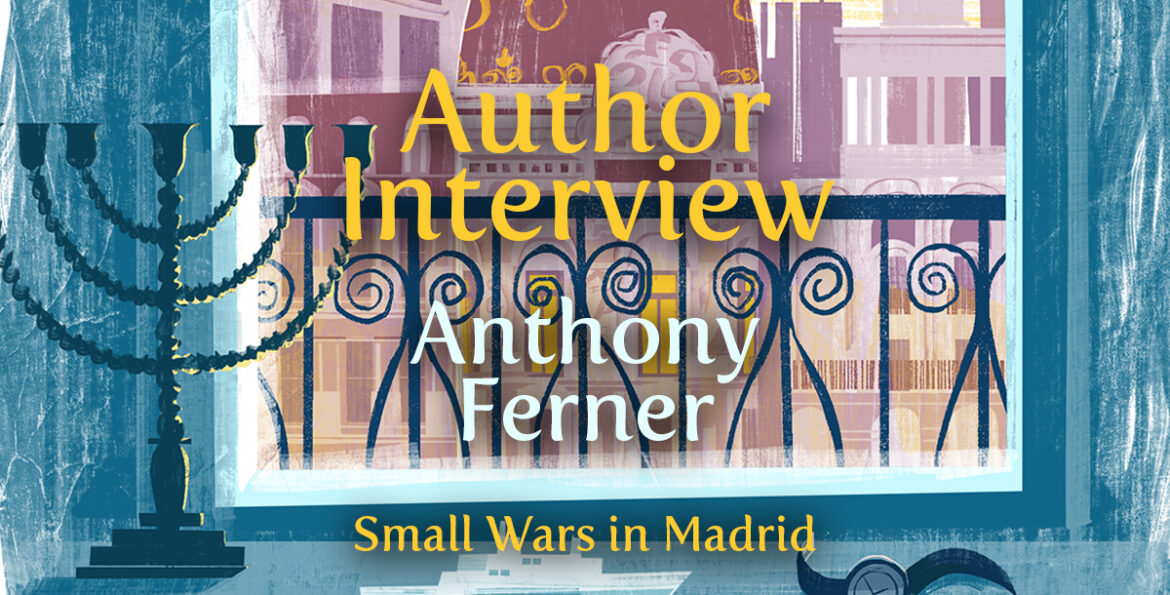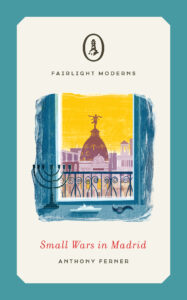

Anthony Ferner interview and exclusive extract
- 14th March 2024
- Category : Author,Blog,Interviews & Blogs
Anthony Ferner’s latest novel Small Wars in Madrid is the 20th addition to the Fairlight Moderns collection. Read ahead to learn about Anthony’s writing journey and for a small excerpt of this new Fairlight Modern.
You have worked on Small Wars in Madrid for 10 years, what motivated you to keep polishing and rewriting until you got to this final version?
The initial trigger for Small Wars in Madrid was a historical screenplay about the Spanish Armada written with my friend John Murphy. As a screenplay, it became clear it had no chance of getting made. Rather than waste all the research and writing effort, I decided to turn a segment of it into a contemporary novel, focusing on one character who intrigued me. Early versions were too close to the screenplay. It took a long time to sever it from its origins and to find modern-day equivalents of the events that befall the protagonist. One development was to introduce a Jewish-Sephardi thread into the narrative. That gave me a story that was as much about identity and belonging as about rugged survival. However, I then found I had two novels in one: the survival story and the Spanish-Jewish family relationships story. Fairlight’s feedback on the manuscript gave me the motivation to keep going. Once I found a way of subjugating the survival thread to the Jewish family story, the novel began to work. So keeping going was a matter of overcoming successive obstacles as they arose. All along I was working on other novels, otherwise I possibly wouldn’t have had the stamina to carry on with Small Wars in Madrid.
Did you find any character easier or harder to write about?
They were all hard! The protagonist, David Aguilera, was in some ways easier as he developed out of a real historical character, who left a memoir that made clear all his anger and resentment at the supposed injustices heaped on him in his career. David has this aspect, plus an inner conflict over reconciling his disparate identities, and on top of that a struggle to be an emotionally more present father and husband. Of the other main characters Margalit was difficult in that she comes from a Sephardi background — i.e. a descendant of the Jews expelled from Spain in 1492; that required a fair bit of research as my own background is Ashkenazi (Jews whose ancestors came from Germany and eastern Europe), and the two traditions differ markedly. Marcelino also comes from an Ashkenazi tradition, but his forebears ended up Argentina. I had to do some research on his peculiar speech patterns, but I do read a fair bit of Argentinian literature, so I have some feel for its distinctive Spanish. Marce and David are both military men, and here I relied almost entirely on secondary sources to give a feel of how their profession might have influenced their respective psyches. But I didn’t do the same amount of research as I’d had to do about the quirky theoretical physicist of my first novel, or the neurosurgeon of my second.
Why did you decide to set this work in Madrid?
As I explain above, the seed of Small Wars in Madrid was sown by a screenplay John Murphy and I wrote more than a decade ago about the Spanish Armada, with a cast of Spanish characters. Once I’d decided to retain that Spanish aspect, I chose Madrid as a location for the practical reason that I know the city and its culture pretty well, and have close Spanish friends: I felt that would help me get ‘under the skin’ of David and the other characters.
What did you find to be the most difficult element to write?
I think the most difficult thing was to integrate the different themes I had in mind when I was writing the novel. Family conflict, the vagaries of love, split identities, the protagonists’ sense of uncertainty in an unstable world. The breakthrough was that I found I didn’t have to dwell too much on external events, just show how they fed through into the minds and emotions of the characters. A key example would be that David’s telling the story of his survival following his shipwreck is now a key mechanism for him to reconnect with his son Rubén, and indeed with his wife Margalit.
What is one thing you want readers to take away from Small Wars in Madrid.
I’d like readers to be interested in the characters. I’d like readers to be moved by them in their faltering attempts to resolve the tricky problems that face them. I’d like the story to linger and resonate in readers’ minds after they’ve finished the book. That’s more than ‘one thing’, but still!
 You have set this novel in a turbulent version of modern Europe, what was the reason behind this decision?
You have set this novel in a turbulent version of modern Europe, what was the reason behind this decision?
Modern Europe is turbulent! I merely tweaked it — e.g. by inventing the ‘European Defence Force’ for whose naval wing David and Marce work. I’m a member of the postwar generation that experienced decades of stability and security, prosperity and peace in Europe following the end of the war. You expected and hoped that that stability would last indefinitely, especially after the fall of the Berlin Wall. But then came the war in former Yugoslavia, and more recently signs of Europe fraying at the edges — most notably the Russian seizure of Crimea, and pro-Russian separatists taking over the Donbas region, in 2014. This alongside a huge migrant crisis that is ongoing, and a major financial crisis at the end of the noughties whose effects were to fragment European unity and create further faultlines within and between countries. (And of course there’s Brexit, not mentioned in the novel, but a spectre at the table, so to speak.) So even before the invasion of Ukraine in February 2022, one had a sense of Europe unravelling at the edges. I merely changed the location of the fictional conflicts to the Baltic Sea and the Baltic states, given that the hero is a naval captain.
I chose to develop this background because I wanted to examine how the broader picture of insecurity and uncertainty feeds through into the ordinary lives of my protagonists, their goals, their anxieties, their family lives, their loves and friendships, and so on; especially as several of the main characters are Jewish and alert to danger signals in their environment like ‘canaries in the coal mine’. There was a long-running soap opera on Spanish television, set in the Franco era, called Amar en tiempos revueltos, which could be translated as Love in Turbulent Times. That was the vibe I wanted for Small Wars in Madrid: love in turbulent times.
You have said that at this novel’s core, it is a love story, would you like to expand on that?
At the heart of the novel are three kinds of love. First, and most obviously, the passionate relationship between David and Margalit. That love, its unravelling and its slow rebuilding, propels much of the story of the novel. Second, family love — of David for his late-discovered Jewish birth mother and (more ambivalently) for his Catholic adoptive mother, as well as for his children, particularly his young son Rubén with whom he must find a way of reconnecting. And third, there’s the love of enduring friendship between David and his comrade Marce; a love that survives physical hardships, moral quandaries and near-mortal disagreements.
You have written several other fictional works such as Inside the Bone Box, Winegarden and A Life in Translation. Have you found the writing process for Small Wars in Madrid to be particularly different from your previous works?
In my first three novels, I wanted to explore the interplay of the protagonist’s professional life and their life outside work, conscious as an ex-academic that one’s job strongly shapes one’s identity and sense of self. Of course, that element is still there in Small Wars in Madrid, but it’s not so central. David, for example, spends very little time in the novel actually in command of a vessel. That’s the first point of difference. Second, the writing process was very different, especially compared with the first two novels. Winegarden began as a single short story, followed by another about the same character, then another. When I’d written three or four stories I realised there could be a connecting thread about the arc of the character’s life. It was more a mosaic of individual pieces than a deliberate novel. To some extent, Inside the Bone Box was similar: starting from individual vignettes of the protagonist’s life and work, a story and a principal character gradually emerged. Small Wars in Madrid is different in that I conceived it as an overarching story from the beginning (partly because of the source material from the Spanish Armada mentioned above), and I had a stronger sense when I started of the main character, so that everything I wrote was intended to get the key characters to meet, to interact, to resolve conflicts, and end up where they needed to end up.
If you could say one thing to David, what would it be?
The reader can tell from the start that David is too haughty, too closed off to those dear to him, too agonised over his own predicament, struggling too solipsistic-ally with his internal conflicts. I’d want to tell him to accept himself, accept his different identities as part-Catholic and part-Jew, as naval man and family man, accept their contradictions and richness… and muddle through. Once he can do that, he should be able to resolve the tensions in his marriage and his alienation from his young son. But of course you can’t tell your characters that sort of thing; they have to find out for themselves. And that is what makes it into a novel.
*
Keep reading for a sneak peek of Small Wars in Madrid…
The apartment buildings across the street from our flat have pale pink façades, wrought-iron balconies, high windows and dark-varnished shutters. I watch the occupants, and some stare back. Disapproving, I imagine, of a man in early middle age lounging around and not working. Especially that old woman who comes out onto her balcony directly opposite to water her potted plants. Thin, censorious lips, Franco-era iron-grey helmet of a hairdo, blue-and white blouse and pearls. (Pearls! On a Monday morning, not even coffee and tostadas time.) With her careful, prim mannerisms and her conservative dress sense, she reminds me of my adoptive mother.
I see her most days, the old woman. Normally she’s on her balcony, but sometimes I’ll spot her coming slowly back from the shops wheeling her wicker basket, anxious at a world that’s no longer stable or predictable or white or Catholic and God-fearing, even though it’s forty years since Madrid, and Spain, were like that. And I share her fear, not about the Catholic whiteness and all that nonsense, but about the world – Europe, at least – and its stability and predictability.
I don’t blame my kids for steering clear of me these past few weeks, Rubén especially. Sara, older, bolder, stroppier, sometimes tiptoes up to the edge, as it were, and peers down into the crater, like she’s daring me to erupt; then scurries away again.
Yesterday morning, Margalit came into the living room with a hard expression and said,
‘David, I’m going.’
‘Going where?’
‘Away.’
She took a look round the apartment, registering its contents, including me.
‘At least tell me…’
She walked to the hall without responding, and went down on one knee to close the zip of a small travel case. I watched the tight curve of her lower back, her hip, the taut flesh of her thigh.
‘I don’t get it.’
‘What is there to get? I’ve had enough.’ She stood up. ‘The kids have had enough. Rubén would love to talk to you, but you snap his head off, or he fears you will. He wants his dad back.’
‘You can’t just leave, I need you here.’
‘There’s plenty of coffee and cigarettes – that’s what you’re mainly living off.’
‘How will it help,’ I said, ‘you going?’
She shook her head, gathering force. Walked over to me, heels clicking on the parquet, hands balled.
‘You don’t talk to me. Don’t touch me, don’t fuck me. Don’t even look at me.’
I didn’t look at her.
‘You’ve been wallowing since you got back. I’m sick of it. The kids are sick of it. The world does not revolve around you.’
Her face was lined and her cheeks looked pale and flabby. It shocked me.
She picked up her case. ‘You have my number.’
‘Just tell me, how long will you be away?’
‘I don’t know.’
*
Small Wars in Madrid is publishing 14 March 2024. Order now from Blackwell’s, Bookshop.org or Waterstones. To look at our full collection of Fairlight Moderns click here.














